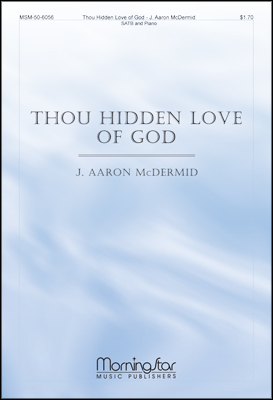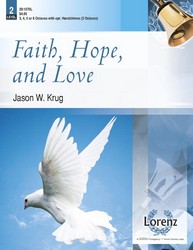- |
User Links
Christ in You, the Hope of Glory

Thou hidden love of God, Whose height
Author (German): Paul Gerhardt; Author (Latin): Gerhard Tersteegen (1729); Translator: John Wesley (1738)Published in 263 hymnals
Printable scores: PDF, MusicXMLPlayable presentation: Lyrics only, lyrics + musicAudio files: MIDI, Recording
Representative Text
1 Thou hidden Love of God, whose height,
whose depth unfathomed, no man knows,
I see from far Thy beauteous light,
and inly sigh for Thy repose;
my heart is pained, nor can it be
at rest till it finds rest in Thee.
2 'Tis mercy all that Thou hast brought
my mind to seek its peace in Thee;
yet while I seek, but find Thee not,
no peace my wand'ring soul shall see.
O when shall all my wand'rings end,
and all my steps to Thee-ward tend?
3 Is there a thing beneath the sun
that strives with Thee my heart to share?
Ah! tear it thence, and reign alone,
the Lord of every motion there;
then shall my heart from earth be free,
when it has found repose in Thee.
4 O hide this self from me, that I
no more, but Christ in me, may live;
my vile affections crucify,
nor let one darling lust survive;
in all things nothing may I see,
nothing desire, or seek, but Thee.
5 O Love, Thy sov'reign aid impart
to save me from low-thoughted care;
chase this self-will from all my heart,
from all its hidden mazes there;
make me Thy duteous child, that I
may ceaseless "Abba, Father," cry.
6 Each moment draw from earth away
my heart, that lowly waits Thy call;
speak to my inmost soul, and say
"I am Thy Love, Thy God, Thy all."
To feel Thy pow'r, to hear Thy voice,
to taste Thy love, be all my choice!
Author (German): Paul Gerhardt
 Paul Gerhardt (b. Gräfenheinichen, Saxony, Germany, 1607; d. Lubben, Germany, 1676), famous author of Lutheran evangelical hymns, studied theology and hymnody at the University of Wittenberg and then was a tutor in Berlin, where he became friends with Johann Crüger. He served the Lutheran parish of Mittenwalde near Berlin (1651-1657) and the great St. Nicholas' Church in Berlin (1657-1666). Friederich William, the Calvinist elector, had issued an edict that forbade the various Protestant groups to fight each other. Although Gerhardt did not want strife between the churches, he refused to comply with the edict because he thought it opposed the Lutheran "Formula of Concord," which condemned some Calvinist doctrines. Consequently, he was r… Go to person page >
Paul Gerhardt (b. Gräfenheinichen, Saxony, Germany, 1607; d. Lubben, Germany, 1676), famous author of Lutheran evangelical hymns, studied theology and hymnody at the University of Wittenberg and then was a tutor in Berlin, where he became friends with Johann Crüger. He served the Lutheran parish of Mittenwalde near Berlin (1651-1657) and the great St. Nicholas' Church in Berlin (1657-1666). Friederich William, the Calvinist elector, had issued an edict that forbade the various Protestant groups to fight each other. Although Gerhardt did not want strife between the churches, he refused to comply with the edict because he thought it opposed the Lutheran "Formula of Concord," which condemned some Calvinist doctrines. Consequently, he was r… Go to person page >Author (Latin): Gerhard Tersteegen
 Tersteegen, Gerhard, a pious and useful mystic of the eighteenth century, was born at Mörs, Germany, November 25, 1697. He was carefully educated in his childhood, and then apprenticed (1715) to his older brother, a shopkeeper. He was religiously inclined from his youth, and upon coming of age he secured a humble cottage near Mühlheim, where he led a life of seclusion and self-denial for many years. At about thirty years of age he began to exhort and preach in private and public gatherings. His influence became very great, such was his reputation for piety and his success in talking, preaching, and writing concerning spiritual religion. He wrote one hundred and eleven hymns, most of which appeared in his Spiritual Flower Garden (1731). He… Go to person page >
Tersteegen, Gerhard, a pious and useful mystic of the eighteenth century, was born at Mörs, Germany, November 25, 1697. He was carefully educated in his childhood, and then apprenticed (1715) to his older brother, a shopkeeper. He was religiously inclined from his youth, and upon coming of age he secured a humble cottage near Mühlheim, where he led a life of seclusion and self-denial for many years. At about thirty years of age he began to exhort and preach in private and public gatherings. His influence became very great, such was his reputation for piety and his success in talking, preaching, and writing concerning spiritual religion. He wrote one hundred and eleven hymns, most of which appeared in his Spiritual Flower Garden (1731). He… Go to person page >Translator: John Wesley
 John Wesley, the son of Samuel, and brother of Charles Wesley, was born at Epworth, June 17, 1703. He was educated at the Charterhouse, London, and at Christ Church, Oxford. He became a Fellow of Lincoln College, Oxford, and graduated M.A. in 1726. At Oxford, he was one of the small band consisting of George Whitefield, Hames Hervey, Charles Wesley, and a few others, who were even then known for their piety; they were deridingly called "Methodists." After his ordination he went, in 1735, on a mission to Georgia. The mission was not successful, and he returned to England in 1738. From that time, his life was one of great labour, preaching the Gospel, and publishing his commentaries and other theological works. He died in London, in 17… Go to person page >
John Wesley, the son of Samuel, and brother of Charles Wesley, was born at Epworth, June 17, 1703. He was educated at the Charterhouse, London, and at Christ Church, Oxford. He became a Fellow of Lincoln College, Oxford, and graduated M.A. in 1726. At Oxford, he was one of the small band consisting of George Whitefield, Hames Hervey, Charles Wesley, and a few others, who were even then known for their piety; they were deridingly called "Methodists." After his ordination he went, in 1735, on a mission to Georgia. The mission was not successful, and he returned to England in 1738. From that time, his life was one of great labour, preaching the Gospel, and publishing his commentaries and other theological works. He died in London, in 17… Go to person page >Text Information
| First Line: | Thou hidden love of God, Whose height |
| Title: | Christ in You, the Hope of Glory |
| German Title: | Verborgne Gottesliebe, Du |
| Author (Latin): | Gerhard Tersteegen (1729) |
| Translator: | John Wesley (1738) |
| Author (German): | Paul Gerhardt |
| Meter: | 8.8.8.8.8.8 |
| Language: | English |
| Copyright: | Public Domain |
Tune
ST. CHRYSOSTOM (Barnby)MAGDALEN (Stainer)
ST. PETERSBURG
Dmitri Stephanovich Bortnianski (b. Gloukoff, Ukraine, 1751; d. St. Petersburg, Russia, 1825) was a Russian composer of church music, operas, and instrumental music. His tune ST. PETERSBURG (also known as RUSSIAN HYMN) was first published in J. H. Tscherlitzky's Choralbuch (1825). The tune is suppo…


 My Starred Hymns
My Starred Hymns






